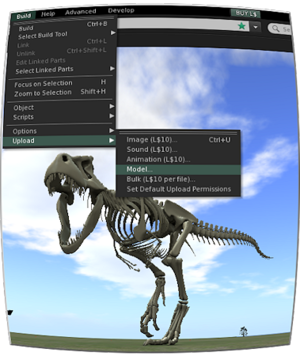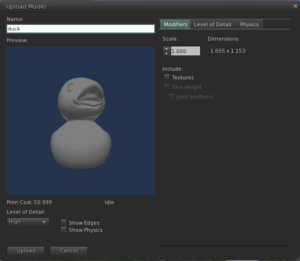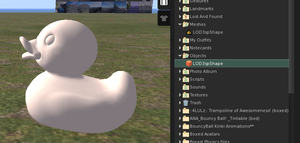Difference between revisions of "Mesh/Uploading a simple mesh"
Bea Linden (talk | contribs) |
|||
| Line 4: | Line 4: | ||
[[Image:MeshWalkthrough-Simple_Mesh_Upload-Splash.png|300px]] | [[Image:MeshWalkthrough-Simple_Mesh_Upload-Splash.png|300px]] | ||
Uploading a mesh is a straightforward process, similar to | Uploading a mesh is a straightforward process, similar to uploading an animation or texture. This walkthrough covers the workflow for uploading a basic object with basic properties. If you're new to mesh, this is where you'll want to get started. This walkthrough bypasses a lot of the more complex customization and advanced features of mesh; we'll get into some of those advanced features in later walkthroughs. | ||
== Get a Second Life compatible mesh file == | == Get a Second Life compatible mesh file == | ||
Second Life's mesh import is able to read [https://collada.org/mediawiki/index.php/COLLADA_-_Digital_Asset_and_FX_Exchange_Schema COLLADA] ('''.dae''') files. | |||
# Click this link -- https://collada.org/owl/download.php?sess=0&parent=126&expand=1&order=name&curview=0&binary=1&id=698/ -- to download the <code>duck.dae</code> COLLADA file. | # Click this link -- https://collada.org/owl/download.php?sess=0&parent=126&expand=1&order=name&curview=0&binary=1&id=698/ -- to download the <code>duck.dae</code> COLLADA file. | ||
# Save the file | # Save the file to your hard drive in a folder where you can find it later. | ||
== Upload the mesh file to Second Life == | == Upload the mesh file to Second Life == | ||
| Line 21: | Line 21: | ||
# Enter a name for your model in the '''Name''' field. | # Enter a name for your model in the '''Name''' field. | ||
# Click the '''Upload''' button. | # Click the '''Upload''' button. | ||
#: Two new assets appear in your inventory: one in | #: Two new assets appear in your inventory: one in the '''Meshes''' folder, the other in the '''Objects''' folder. | ||
#: For the duck object, these new assets are named '''LOD3spShape'''. | #: For the duck object, these new assets are named '''LOD3spShape'''. | ||
#: Note: | #: Note: For this walkthrough, we only care about the asset in your '''Object''' folder. | ||
== Add your mesh object to the world == | == Add your mesh object to the world == | ||
[[File:MeshWalkthrough-Rez_Object.png|right|300px|thumb|Rezzed object]] | [[File:MeshWalkthrough-Rez_Object.png|right|300px|thumb|Rezzed object]] | ||
You can now manipulate your mesh like any other object in your inventory: | You can now manipulate your mesh like any other object in your inventory: | ||
# Find | # Find the '''LOD3spShape''' object in your inventory's '''Objects''' folder. | ||
#: If you're having trouble or have a large inventory, use your inventory's '''RECENT''' tab view. | #: If you're having trouble finding the object or have a large inventory, use your inventory's '''RECENT''' tab view. | ||
# Drag the new object from your '''Objects''' folder to any place on the ground inworld where you have permissions to build. | # Drag the new object from your '''Objects''' folder to any place on the ground inworld where you have permissions to build. | ||
#: A duck model appears on the ground. | #: A duck model appears on the ground. | ||
| Line 36: | Line 36: | ||
== Experiment with other Mesh files == | == Experiment with other Mesh files == | ||
[[File:MeshWalkthrough-Download_File.png|right|300px|thumb|Download menu from [https://collada.org/owl/browse.php?sess=0&parent=126&expand=1&order=name&curview=0&sortname=ASC COLLADA Test Model Bank] ]] | [[File:MeshWalkthrough-Download_File.png|right|300px|thumb|Download menu from [https://collada.org/owl/browse.php?sess=0&parent=126&expand=1&order=name&curview=0&sortname=ASC COLLADA Test Model Bank] ]] | ||
You can also experiment uploading other files from COLLADA's repository. Due to the fact that Mesh is still in beta, | You can also experiment uploading other files from COLLADA's repository. Due to the fact that Mesh is still in beta, you may not have success with all of these: | ||
# Download any '''.dae''' file from the [https://collada.org/owl/browse.php?sess=0&parent=28&expand=1&order=name&curview=0&sortname=ASC COLLADA public repository]. | # Download any '''.dae''' file from the [https://collada.org/owl/browse.php?sess=0&parent=28&expand=1&order=name&curview=0&sortname=ASC COLLADA public repository]. | ||
[[Category:Mesh]] | [[Category:Mesh]] | ||
Revision as of 09:43, 2 December 2010
Uploading a mesh is a straightforward process, similar to uploading an animation or texture. This walkthrough covers the workflow for uploading a basic object with basic properties. If you're new to mesh, this is where you'll want to get started. This walkthrough bypasses a lot of the more complex customization and advanced features of mesh; we'll get into some of those advanced features in later walkthroughs.
Get a Second Life compatible mesh file
Second Life's mesh import is able to read COLLADA (.dae) files.
- Click this link -- https://collada.org/owl/download.php?sess=0&parent=126&expand=1&order=name&curview=0&binary=1&id=698/ -- to download the
duck.daeCOLLADA file. - Save the file to your hard drive in a folder where you can find it later.
Upload the mesh file to Second Life
Next, take the file that you downloaded to your computer and upload it to Second Life:
- Select Build > Upload > Model from the menu at the top of the Second Life Viewer.
- Alternatively, open My Inventory, click + at the bottom, and select Upload > Model.
- A file upload window opens.
- Find and select the
duck.daefile from your computer.- The Upload Model window opens.
- Enter a name for your model in the Name field.
- Click the Upload button.
- Two new assets appear in your inventory: one in the Meshes folder, the other in the Objects folder.
- For the duck object, these new assets are named LOD3spShape.
- Note: For this walkthrough, we only care about the asset in your Object folder.
Add your mesh object to the world
You can now manipulate your mesh like any other object in your inventory:
- Find the LOD3spShape object in your inventory's Objects folder.
- If you're having trouble finding the object or have a large inventory, use your inventory's RECENT tab view.
- Drag the new object from your Objects folder to any place on the ground inworld where you have permissions to build.
- A duck model appears on the ground.
You can use the duck mesh as you would any other object -- scale it, texture it, attach it, script it, whatever you like.
Experiment with other Mesh files

You can also experiment uploading other files from COLLADA's repository. Due to the fact that Mesh is still in beta, you may not have success with all of these:
- Download any .dae file from the COLLADA public repository.
- Follow the above steps to upload this file to Second Life.
Continue on to Uploading a multi-material mesh.


